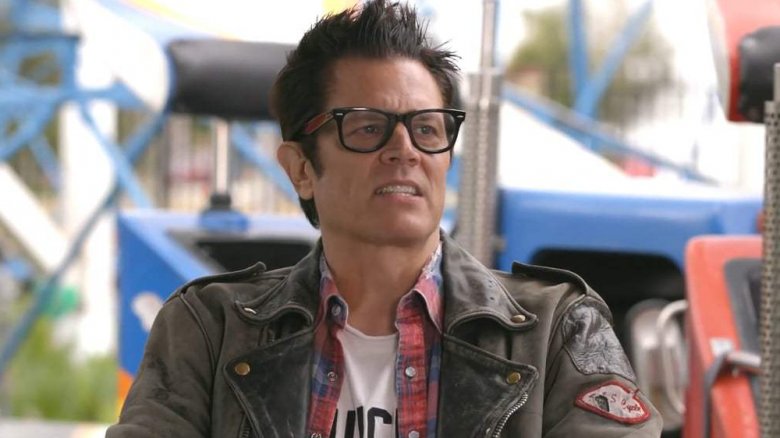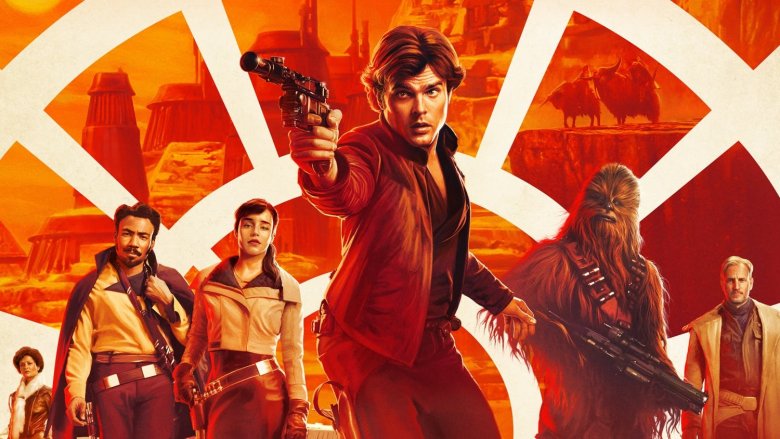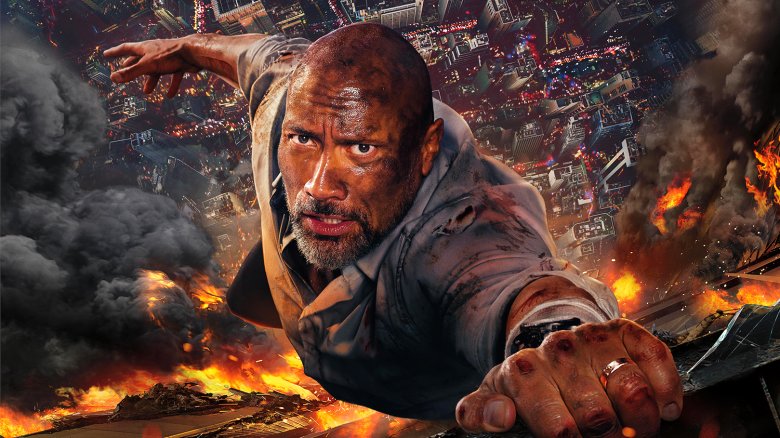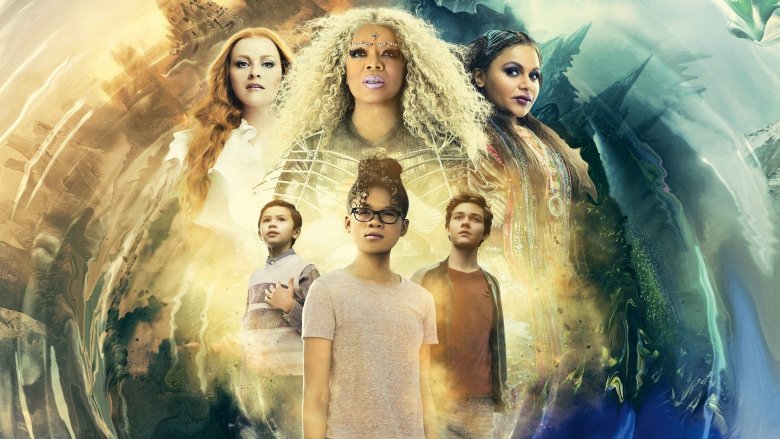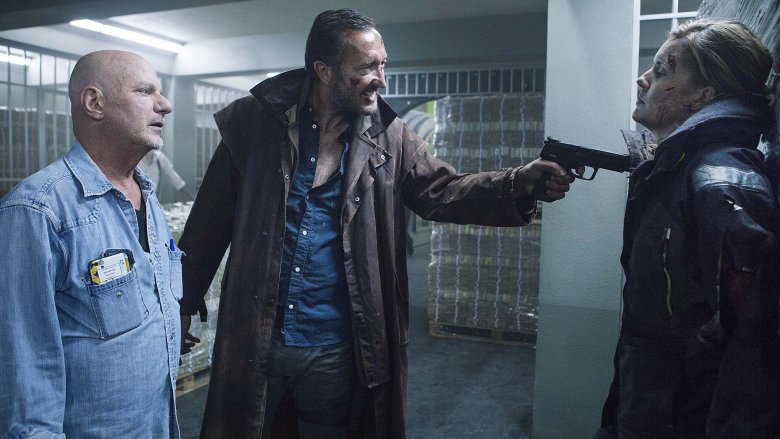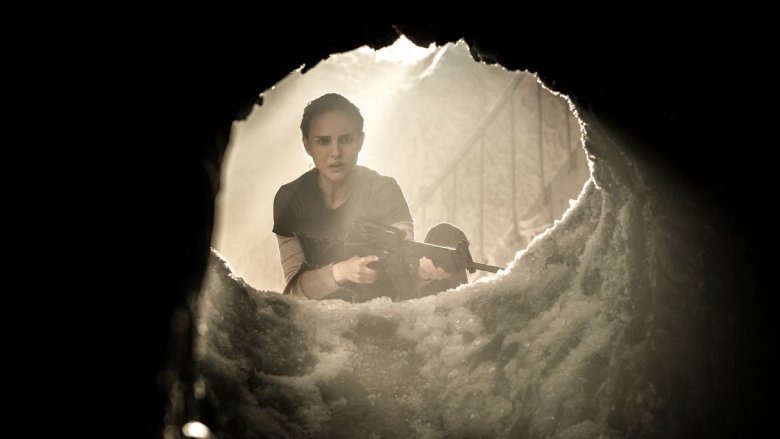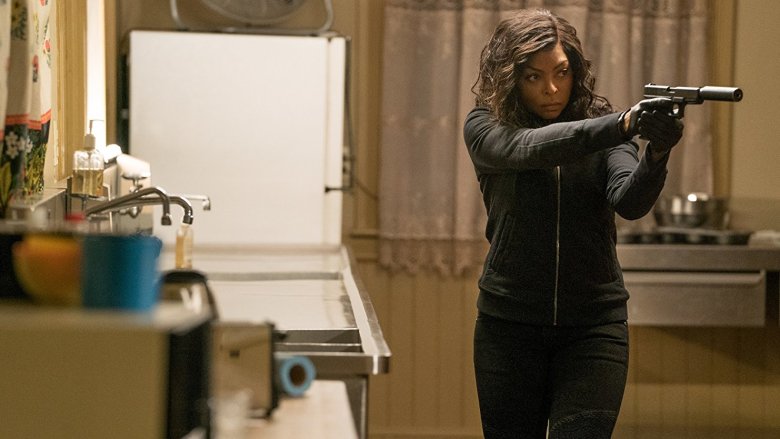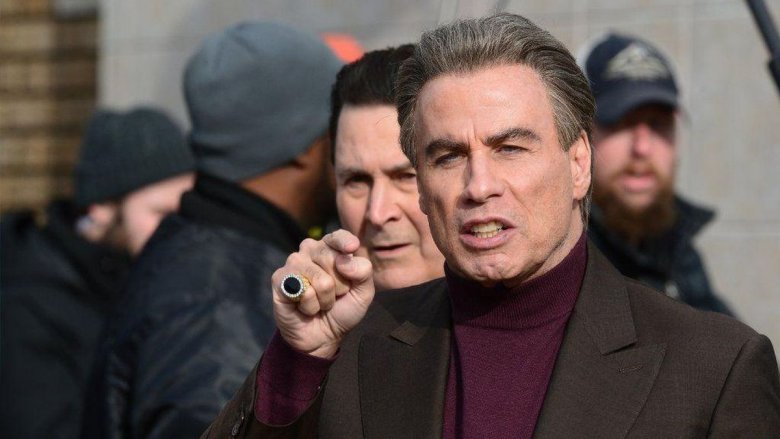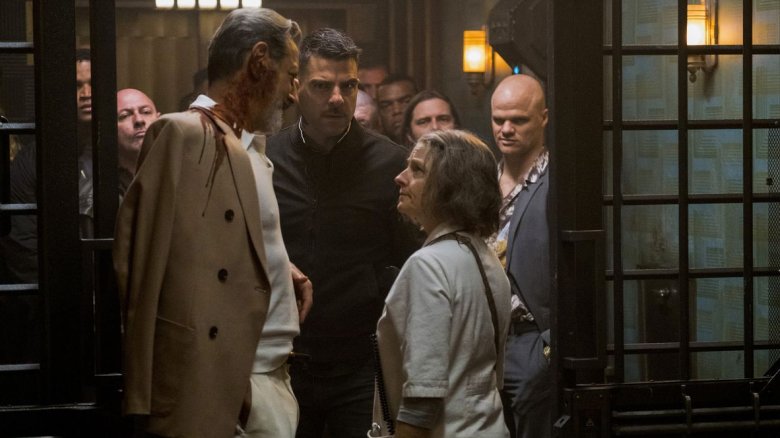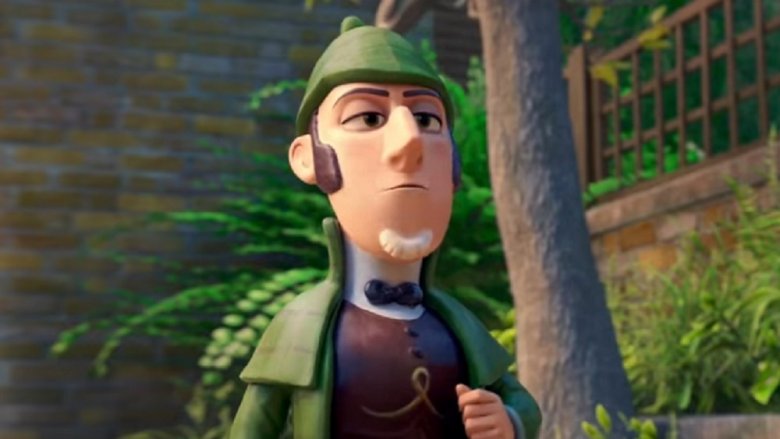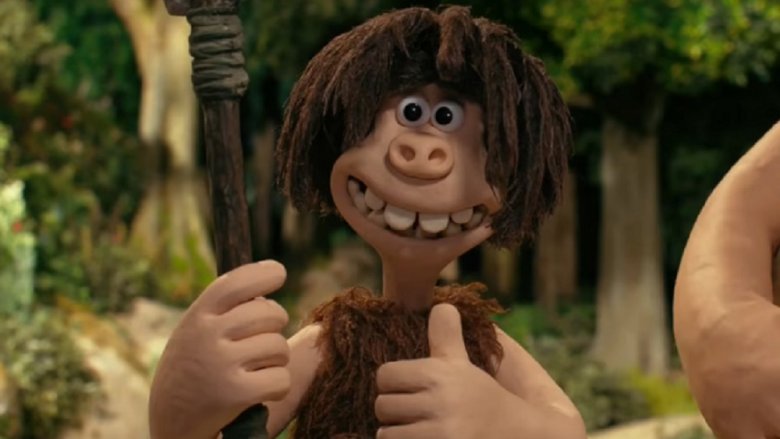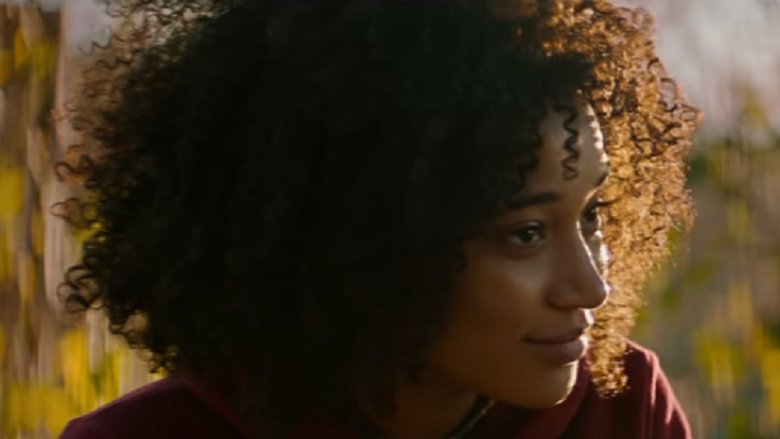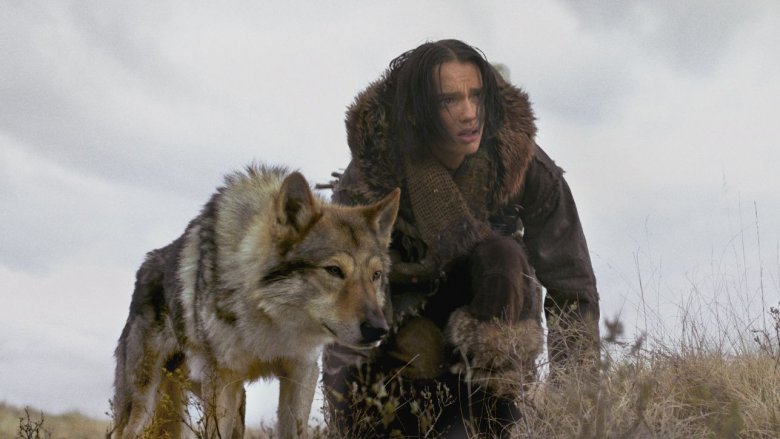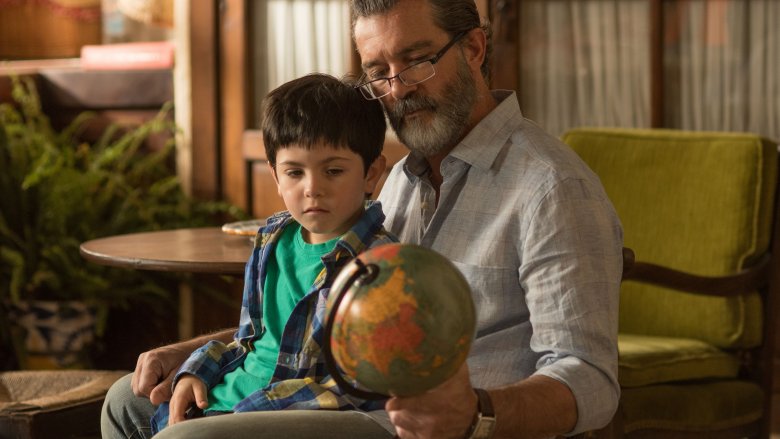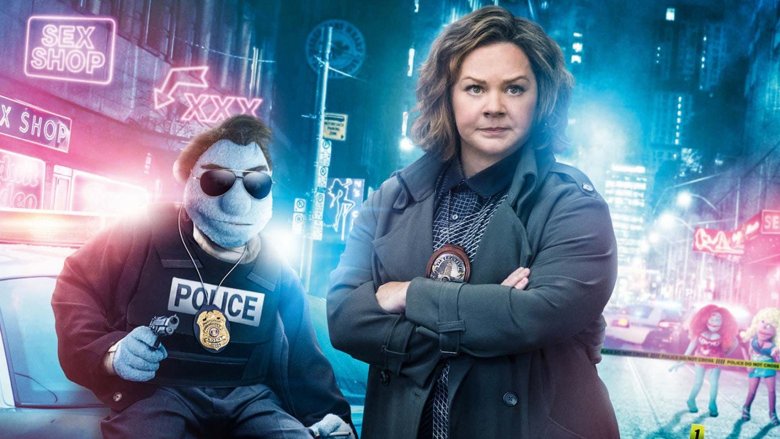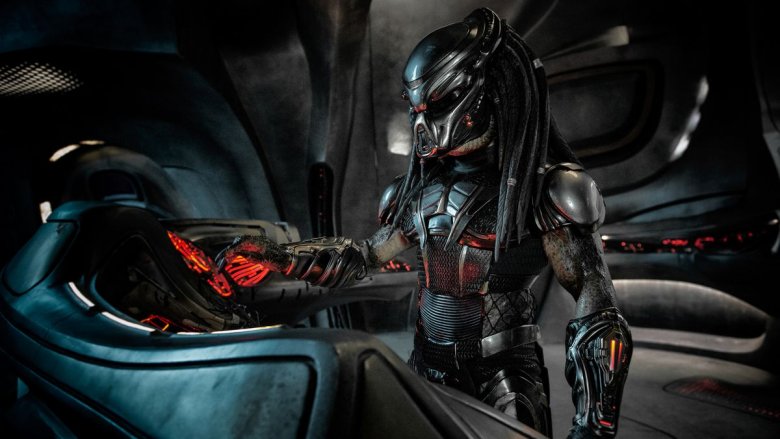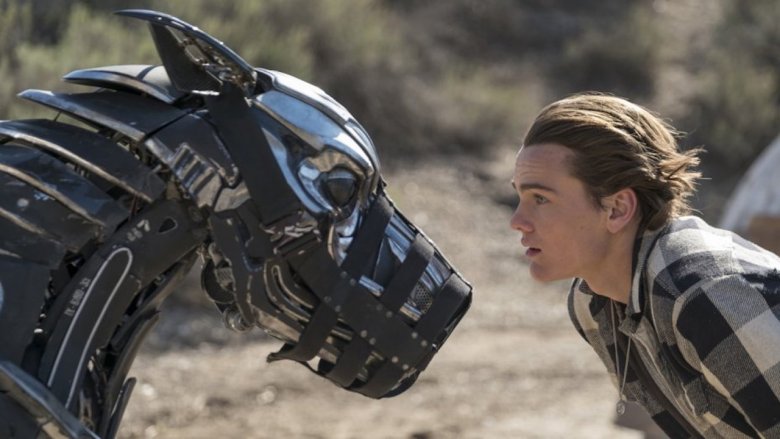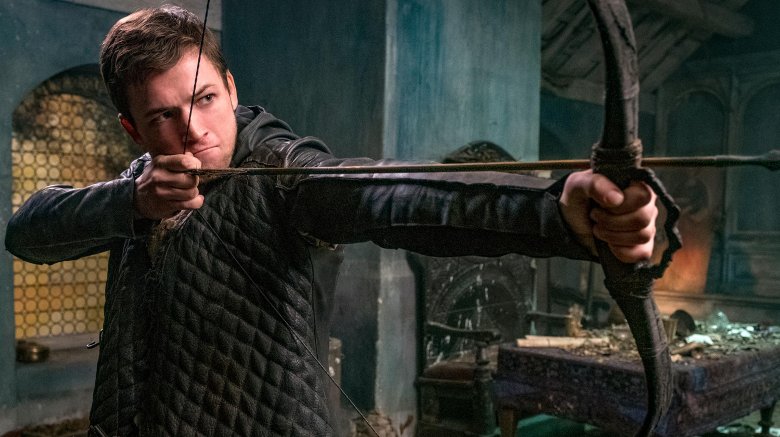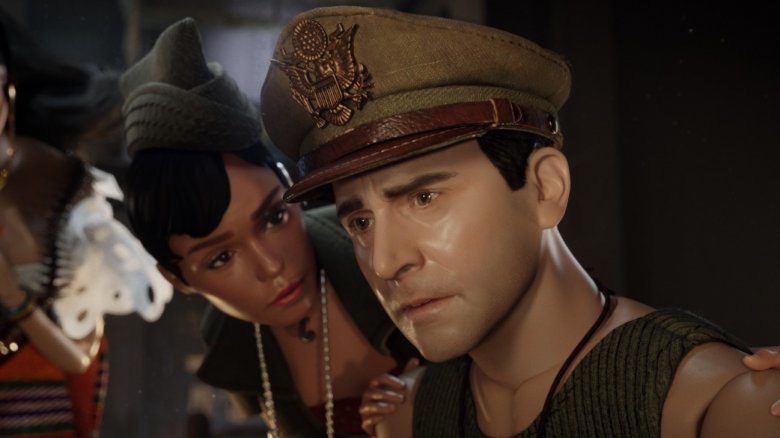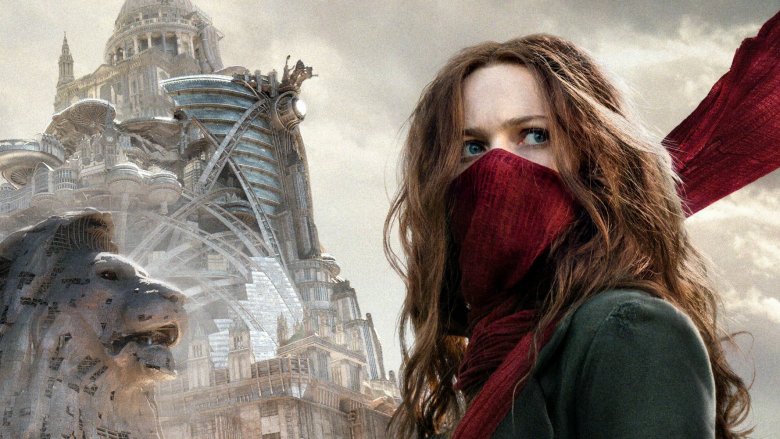The Real Reasons These 2018 Films Flopped At The Box Office
With the absurd amount of content flooding our multiplex screens every year, it stands to reason that there more than a few films will fail to score with the public. A huge number of factors can help determine a film's success (or lack thereof), from scathing critical notices to stiff competition to anemic marketing campaigns, and even worthy releases can easily find themselves pegged with the dreaded label of "box office flop." When you have the audacity to stray from tried-and-true Hollywood formula or open against the latest Avengers film, even the most heartfelt creative efforts can easily fail to get butts in the seats.
These efforts all suffered that unfortunate fate. Some were highly anticipated, some looked intriguing on the surface but failed to deliver, and some struggled to even make the public aware of their existence, but they all have one thing in common: they tanked badly at the box office. Here are the real reasons each of these films flopped at the box office in 2018.
Solo: A Star Wars Story
It seems silly to even entertain the notion that a Star Wars movie could be anything but wildly profitable, yet here we are. Solo: A Star Wars Story opened in May to a shrug from audiences, and its underwhelming box office left it the first film the franchise to be branded a bona fide flop. The red flags were there from the beginning: from original directors Phil Lord and Chris Miller (The Lego Movie) departing late in production to incoming director Ron Howard being forced to reshoot three-quarters of the movie to star Alden Ehrenreich requiring on-set acting coaching, it seemed as if everything that could go wrong did. But it's not that the film turned out to be a complete stinker — it's just that Solo was not the Star Wars film fans wanted.
The same fans who were famously divided over The Last Jedi were even more underwhelmed this time around, as many felt that fleshing out the backstory of one of the franchise's most beloved characters simply wasn't necessary. While Donald Glover provided a bright spot as a young Lando Calrissian, Ehrenreich simply turned in a pretty good performance in service of a thin story that did nothing to serve the greater series. Star Wars fatigue may also have been a factor, and the decision to open the film with Avengers: Infinity War still in theaters may have played a part as well — somewhat ironically, it wasn't just one thing that sunk Solo.
Skyscraper
Dwayne "The Rock" Johnson starring in your picture is usually a pretty safe indication of box-office success. Just look at this year's Rampage, which grossed nearly half a billion dollars worldwide despite middling reviews and being based on a decades-old video game. Audiences have allegedly been hungry for new, interesting IP which isn't a sequel, remake or reboot, and with Universal hyping the picture as this generation's answer to Die Hard and The Towering Inferno, Skyscraper seemed genetically engineered to put butts in seats. Critics were once again split down the middle, but audiences were supremely uninterested — perhaps due to the fact that the film leaned a little too heavily into its "homage" status.
Even critics who were entertained found it to be incredibly derivative. This may not be as much of a problem overseas — the picture takes place in Hong Kong and features an international cast, so it was calibrated for success in other territories — but its anemic North American box office made it virtually impossible to turn a profit. With a $125 million budget and an expensive advertising campaign to match, Skyscraper would have had to do absolute gangbusters overseas to avoid losing money, and this also failed to materialize. Whether crowds were turned off by the familiar story, experiencing a bit of Rock fatigue, or a little of both, Skyscraper turned out to be a whiff for the magnetic star.
A Wrinkle in Time
Aside from the fact that it's an adaptation of a beloved novel, A Wrinkle in Time encouraged high expectations with its absolutely stellar cast and its obvious commitment to diversity. It was the first big-budget tentpole film to be directed by a black woman (the exceedingly talented Ava DuVernay), and that amazing cast included young Storm Reid in the lead role, along with the likes of Mindy Kaling, David Oyelowo and Oprah Winfrey. With YA franchises such as Harry Potter and The Hunger Games banking big bucks in recent years, it could have been reasonably expected to be a smash hit, pulling in huge, wildly diverse audiences much like Black Panther had a month earlier. This, however, turned out not to be the case.
All of those wonderfully diverse audiences simply failed to materialize, and — perhaps due to lukewarm critical response — the usual YA crowd largely declined to turn out as well. The film's convoluted marketing certainly didn't help matters, confusing audiences unfamiliar with the source material's labyrinthine plot. While Black Panther continued to rack up the box office receipts, Wrinkle limped to just over $100 million domestically, and it didn't fare much better overseas. The film amounted to a rare total whiff for Disney, and with marketing costs factored in, it's estimated that the House of Mouse may have lost close to $200 million on the project.
Action Point
Action Point had an absolutely golden premise. Based on a notoriously dangerous (and now defunct) real-life New Jersey theme park, the film starred Johnny Knoxville and Chris Pontius of Jackass fame as the irresponsible owners of a ramshackle destination that's only slightly less hazardous than your average war zone. Featuring plenty of actual, life-and-limb threatening stunts from its seasoned performers, Action Point promised lowbrow belly laughs along the lines of the Jackass film series, or at least Bad Grandpa. There was only one problem: the movie's awful.
Fans found the theme park narrative to be awkwardly grafted onto what could easily have just been another Jackass movie, and some even thought Knoxville was getting a little long in the tooth to continue convincingly pulling off his man-child daredevil schtick. Even though Knoxville practically killed himself making the movie, the stunts were also seen as uninspired and the laughs were few and far between. With its comparatively meager $19 million budget, the film must have seemed like a sure thing for Paramount; after all, Bad Grandpa cleaned up at the box office just five years ago. But Action Point's poor execution was its doom; it struggled to make back even a quarter of its budget, leading to the very real possibility that we've seen Johnny Knoxville grievously injure himself for our amusement for the last time.
The Hurricane Heist
Despite not being a sequel, reboot or adaptation, The Hurricane Heist looked like guaranteed dollar signs due to its high concept and directorial pedigree. Rob Cohen gave us the original Fast and the Furious and xXx, both high-octane, stunt-heavy actioners which bloomed into surprisingly profitable franchises. The plot is explained succinctly by its title — a band of thieves attempt to rob the U.S. Mint during a Category 5 storm — and the film appeared to be a welcome throwback to the intense, Die Hard-esque thrillers of yesteryear. Unfortunately, The Hurricane Heist threw back just a bit too hard.
Reviews skewered the movie for being ridiculously derivative (said the Village Voice: "It's like the filmmakers went into the Die Hard Store, stretched out their arms, rolled their eyes back, and bellowed, 'Give me eeevvveeeerryything!'"). Also: head-scratchingly dumb, full of plot holes, and poorly shot and edited. Audiences stayed away in droves; the movie failed to break $1 million on its opening day, and finished its theatrical run having barely grossed $6 million on a budget six times that. More than one reviewer even likened it to Sharknado without the sharks, and the film likely wouldn't have tanked any harder with audiences had that been its tagline.
Annihilation
Annihilation, based on the acclaimed Jeff VanderMeer novel of the same name, is by most accounts a very good film. Natalie Portman heads up an amazing cast including Oscar Isaac, Jennifer Jason Leigh and Tessa Thompson as a scientist who must lead her team into the Shimmer, a geographical area where the rules of reality no longer seem to apply. The film's heady premise and assured direction by Alex Garland (Ex Machina) won over critics — but audiences responded with surprising indifference, due largely to studio Paramount hyping it as a tentpole picture which had practically zero appeal to kids.
Multiplex fare aimed squarely at adults has struggled in recent years, in direct proportion to its ever-increasing availability on streaming services, and Paramount may also have exacerbated this problem by striking a deal for the film's international rights with Netflix prior to release. The film dropped on Netflix around the time of its theatrical release in virtually every market except North America and China, severely cutting into its overseas profitability, and Annihilation had the distinct misfortune of going up against the juggernaut that was Black Panther in the States. The film failed to make back its $40 million budget, but considering all the rave reviews, everyone who took a pass at the theater will almost certainly catch it eventually — on Netflix.
Winchester
Winchester appeared to have both the premise and the pedigree to be a potential horror classic. Dame Helen Mirren starred as Sarah Winchester, heiress to the gun manufacturer's fortune, who spent decades building addition after addition onto her famous mansion, the construction practically never stopping during the entire time she resided there. The real Sarah Winchester may have been plagued by poor mental health and an abundance of time and money, but Winchester posited that she was driven by something decidedly more sinister... and supernatural.
Writer/directors the Spierig Brothers delivered a nifty sci-fi thriller in 2014's Predestination, but their previous gig had been as guns for hire on Jigsaw, the eighth film in the Saw franchise, which was less well-received. With Winchester they displayed a distinct lack of interest in elevating the material, relying on cheap jump scares and questionable plotting in lieu of anything resembling atmosphere or tension. Many critics wondered how they were able to coax the great Mirren into appearing in the film, which was described as "unforgivably unimpressive" and "a surprisingly flaccid affair."
Proud Mary
Taraji P. Henson is an unquestionably talented actress with a seeming knack for selecting the exact wrong theatrical vehicles for those talents. She made a splash with her role in 2005's Hustle and Flow and has drawn raves as the star of Fox TV's Empire, but her big-screen outings have missed more often than they've hit, and 2018 was a particularly brutal year. She was singled out as a bright spot in the mess that was Tyler Perry's Acrimony, but Perry's films always find their audience; not so with Proud Mary, which featured Henson as a hard-boiled professional killer forced to look after a child after a hit goes awry.
As succinctly summed up by Forbes, the picture is a total mess: "choppy, seemed to be missing an entire first act, and defined its female protagonist entirely by male gaze, maternal instinct and gender-driven guilt. More importantly, it frankly doesn't have many marketable elements beyond its marquee star." A loud, public razzing from John Fogerty (who wrote the Creedence Clearwater Revival hit of the same name) probably didn't help, but in the end, Proud Mary was a victim of its own poor execution.
Gotti
The John Travolta biopic Gotti got a lot of press due to its star and subject, infamous mob boss John Gotti, leading up to its screening at Cannes. But its reception at the festival was less than rapturous, and upon its June release in the U.S., few critics bothered to review it. Literally every single one that did panned it up one side and down the other — leading the film's social media account to pin its subsequent poor box office showing on unfair negative reviews. Considering that fewer than 40 critics have reviewed Gotti at all, it seemed a bit disingenuous — the problem may not be those few dozen pundits, but the many, many things they found wrong with it.
Literally every aspect of the film's production was roundly blasted, from its lack of coherent themes and ham-fisted direction to Travolta's "distractingly terrible" lead performance. The movie failed to even make back half of its paltry $10 million budget, and those involved in its production and seeking a reason for its failure would probably do better to watch the unwatchable picture rather than trying to pin the blame on reviewers, who — to paraphrase the great Roger Ebert — were just doing their jobs.
Hotel Artemis
Hotel Artemis is a futuristic sci-fi thriller boasting a cast that any first-time feature director would probably give a pinky for: Jodie Foster, Sterling K. Brown, Charlie Day, Dave Bautista and Jeff Goldblum, to name a few. Drew Pearce (the scribe behind Mission Impossible: Rogue Nation and Iron Man 3) helmed the story set in a dystopian future revolving around a secret hospital for criminals, but the novice director's preference for style over substance resulted in what could have been a mind-blowing premise falling curiously flat — and the film's marketing, largely free of plot or character details, did nothing to pull audiences in.
Those willing to take the plunge were met with a convoluted plot laced with laborious, needlessly expository dialogue; even the cast, anchored by Foster, couldn't seem to make sense of the proceedings. Despite working from his own screenplay, Pearce managed to deliver a picture that felt half-baked, in which surprisingly little actually happens despite copious amounts of indifferently staged action and violence. Even its kindest critics viewed it as little more than "pretty cool to look at," which was nowhere near enough to engage audiences in an era when a new Marvel, Star Wars or Jurassic World film drops seemingly every month. Despite its modest $15 million budget, Hotel Artemis didn't even crack half that at the domestic box office — as any good hotel owner will tell you, you just can't turn a profit with that kind of vacancy rate.
Sherlock Gnomes
Those of us who even remember Gnomeo and Juliet may have been surprised to find that it was getting a sequel, but the 2011 animated feature quietly did nearly $200 million at the box office, so another outing was never in doubt. Somehow in development for six years, Sherlock Gnomes returned us to Gnomeworld with Johnny Depp in the title role, supported by the likes of Sir Patrick Stewart and James McAvoy — but it was a return trip audiences had no interest in taking.
While it can perhaps be argued that Paramount waited too long to capitalize on the success of Gnomeo, it can be just as effectively argued that a more expedient production schedule wouldn't have made a difference. The film fell just as flat with audiences as it did with critics, and not even a batch of tunes from producer Elton John could paper over the fact that Sherlock simply wasn't any good. Critics found the film to be devoid of wit and charm, while committing the additional offenses of being boring, needlessly convoluted and forgettable. It's tough to fault Paramount for attempting to cash in on their surprise hit, but in this case, lightning struck only once.
Early Man
Animation studio Aardman, with their distinctive claymation aesthetic, has long been Britain's answer to Pixar. From their beloved Wallace & Gromit shorts to feature films Chicken Run and Arthur Christmas, the studio has trafficked in consistently witty, visually appealing fare which has also managed to find a place in the hearts of American filmgoers. But with Early Man, Aardman struck out hard with audiences.
While the film was mostly well-received by critics, dissenters picked out flaws which may illuminate why the film failed to resonate with moviegoers — including a comparatively bland visual style and a plot lacking anything resembling an arc for main character Dug and his tribe of prehistoric goofballs, seemingly existing only as a framework upon which to hang tired, kid-friendly life lessons. The trademark British wit was also found to be sorely lacking, and overall the film was viewed as a lazy effort with none of the heart that fans of Aardman have come to expect. Released in North America the same day as that pesky international blockbuster Black Panther, Early Man was doomed from the start, barely registering a blip at the box office.
The Darkest Minds
The Darkest Minds seemed to come with a built-in audience. It's an adaptation of the well-received young adult novel of the same name, with an attractive cast of fresh-faced stars, featuring a timely government-run-amok narrative and superpowered characters that could have come straight from the latest X-Men movie. Unfortunately, critics took the film to task for being muddled, confusing and trite — and it whiffed with audiences as well, failing to even clear $6 million in its opening weekend.
As to why that is, a good many critics were strongly of the opinion that Minds — while appearing to celebrate diversity and individuality — is guilty of pandering to its audience, giving them a predictable story full of tired cliches and plot twists which are telegraphed from a mile away. The A.V. Club's A.A. Dowd even went so far as to say, "The Darkest Minds is such a formulaic hodgepodge of secondhand plot points that it can't help but feel like an insult to its target demographic: just another case of adults trying to manipulate kids, this time by bilking them out of their allowance." YA audiences are not always the most discriminating, but in the case of The Darkest Minds, assembling rehashed plot points from better movies in the service of a poorly scripted, indifferently shot picture was simply not enough to get them in the seats.
Alpha
Alpha was heralded by many critics as a welcome return to form for Albert Hughes, who — as one half of the Hughes Brothers — was responsible for the classic hard-boiled crime pictures Menace II Society and Dead Presidents. It's the story of a prehistoric youth who becomes separated from his hunting group, and in order to survive, he partners up with a lone wolf abandoned by its pack, who essentially becomes humanity's first-ever canine companion. It's a thrilling, gorgeously-shot adventure, one some critics have suggested could even play in museums after its theatrical run — but while the film scored with critics, it failed to connect with audiences.
With an advertising campaign which seemed to be aimed more squarely at dog lovers than fans of epic adventure, Alpha simply didn't generate the kind of positive word of mouth that would have given it any legs during its theatrical run. It also had the misfortune of squaring off against Crazy Rich Asians, a surprise hit which reinvigorated the rom-com genre, and The Meg, which featured Jason Statham fighting a giant shark and therefore cleaned up at the box office. Alpha failed to make back its budget domestically, but it seems destined for a robust second life on home video; it's an excellent film, and every self-respecting dog owner will want to make it a part of their library.
Life Itself
NBC's This Is Us has become one of network television's breakout hits of the last few years, so it stood to reason that the melodramatic, family-oriented formula could translate to beaucoup big-screen bucks. At least, that was Amazon Studios' thinking; they recruited series creator Dan Fogelman to write and direct Life Itself, a similarly-themed feature with an all-star cast including Olivia Wilde, Oscar Isaac, and Antonio Banderas. Amazon went big with a wide, 2,609-screen release; then, they went home, as Life Itself had the worst run of any film to open on 2,500-plus screens... ever.
Vanity Fair described the film as having "died gruesomely at the box office," which was probably being too kind. It struggled to a $2.1 million gross for a pitiful $807 per screen average over its opening weekend, which can only partially be chalked up to absolutely brutal reviews. Fogelman appeared to have been attempting to make a weepy melodrama which would be all things to all people, ostensibly encouraging white males to confront their privilege while catering to their gaze, and couching itself in feminism while featuring multiple examples of the exhausted Manic Pixie Dream Girl trope. Critics who caught its debut at the Toronto International Film Festival ripped it to bits, and Fogelman initially tried to blame its resounding flop on white male critics who just didn't "get it" rather than take responsibility for his almost comically tragic, over-the-top misfire. One potential upside: Amazon learned a $10 million lesson about biting off more than it can chew.
The Happytime Murders
After years of development, Brian Henson — the son of legendary Muppets creator Jim Henson — finally got to bring his passion project, The Happytime Murders, to theaters. Unfortunately, said passion project was the antithesis of everything his father stood for — or, as one of the film's most blistering reviews put it, it was a film that had nothing to offer audiences "unless they enjoy movies that combine raunchy and unfunny with boring and incompetent." And there was the problem in a nutshell: the vulgar, scatological puppet-based comedy was far too raunchy for fans of Henson's work, and executed too poorly to engage audiences who showed up expecting all the raunch.
The film constituted another gigantic whiff for talented star Melissa McCarthy, who never met an ill-advised starring vehicle she didn't like, and an inauspicious feature debut for Henson, who perhaps should have stuck to pumping up his formidable television resume. The film barely made back half its budget domestically in the wake of withering critical notices and toxic word of mouth. There's definitely a lesson to be learned here: when it comes to gross-out comedy, mere shock value isn't enough. You've got to actually bring some clever humor to the table — even when you're dealing with puppets. Especially when you're dealing with puppets.
The Predator
All year long, fans of sci-fi/horror were pumped beyond belief for The Predator, a seemingly fresh new entry in the series originated by the 1987 Arnold Schwarzenegger classic Predator. It had a unique spin on the story template (Predators running wild in suburbia), a great cast including Keegan-Michael Key, Thomas Jane and Olivia Munn, and the sure directorial hand of Shane Black (Iron Man 3) — who, as an actor, appeared in the original film. All the pieces were in place, but a funny thing happened on the way to the multiplex: all involved forgot to assemble those pieces into a watchable, entertaining whole.
The film's fortunes weren't helped by Munn's revelation that she'd been duped into shooting scenes alongside a friend of Black's who is a convicted sexual... um... predator (or Black's half-hearted apology), but this was the least of its problems. Black and company seem to have vastly overestimated the public appetite for the sequel beyond the original's fanbase, and the film itself simply failed to deliver the fresh take on the franchise that its suburban setting promised. Add to the mix a sequel hook that seemed to set up a far more interesting film than the one audiences had just seen, and said audiences were left wondering why they weren't given that movie instead. Ironically, the film's underwhelming box office means that this next promised installment may never even see the light of day.
A.X.L.
Just your typical "boy and his robot dog" movie, A.X.L. seemed scientifically calibrated to pull in the family dollar in late-summer wide release. It opened against a dearth of competition, and its trailers showed off the cool design of its military-hunter-killer-unit-turned-man's-best-friend title character while offering a formula proven to snare young audiences all the way back to 1982's E.T. The Extra-Terrestrial. There were only several problems: the lack of a decent script, any personality for its characters, or an engaging story... you know, all the things that made its obvious inspiration so special.
Critics compared the film to "a pastiche of parts constructed in a lab," almost universally name-checking the superior examples of its formula that had come before. Audiences took heed, sending A.X.L. limping home with an egregiously paltry domestic gross of less than $7 million. The film actually contributed to the demise of its production house Global Road, whose other 2018 offerings Artemis Hotel and Show Dogs similarly failed to find their audiences. It just goes to show that a high-concept, reliably formulaic premise isn't everything — you have to actually make an engaging film, and first-time writer/director Oliver Daly utterly failed in that regard.
Robin Hood
Medieval epics are notoriously hit and miss, and the latest big-screen iteration of Robin Hood was far more miss than hit. Critics savaged the film for its forced edginess, winking anachronisms and an emphasis on spectacle, none of which would have mattered had it hooked audiences. But they were a little busy the weekend of its release — flocking to see Ralph Breaks the Internet and Creed II, both eagerly anticipated sequels which also had the benefit of being very good. The two hits combined to rake in nearly $92 million between them, and Robin Hood also faced competition in the form of animated feature The Grinch (in its third week) and Fantastic Beasts: The Crimes of Grindelwald (in its second).
When the dust cleared, Robin Hood finished its opening weekend in seventh place, failing to scrape together even $10 million domestically. The film's aggressive marketing campaign probably didn't help matters, as it seems audiences simply found no purpose in an updated, edgy take on a tale that Hollywood has literally been telling for over century. The $100 million film is one of the biggest money losers of the last couple years, and that's saying something.
Welcome to Marwen
Director Robert Zemeckis' Welcome to Marwen seemed to have a lot going for it. The esteemed director's latest project was based on the compelling true story of a man coming to terms with a damaging traumatic event through his art and photography, tailor-made for the holiday season; its adventurous aesthetic (in which much of the story takes place inside of a fictional town populated by articulated models created by our hero) promised a unique vision, and it featured an interesting cast, with the likes of Steve Carell, Janelle Monae, and Gwendoline Christie all taking part. But the picture turned out to be rather unequal to the sum of its parts, with reviews blasting it for failing to connect with audiences emotionally and for being a complete tonal mess.
Exhibitors who previewed the film were profoundly worried that studio Universal had a flop on its hands, and they were right on the money. Opening against such competition as Warner Brothers' Aquaman and Disney's Mary Poppins Returns, Marwen posted an abysmal showing in its opening frame, and it didn't get any better from there. The $39 million picture struggled to breach the $10 million mark, and with its advertising expenses figured in, it lost upwards of $40 million for Universal. Unfortunately, Marwen didn't constitute the biggest flop of the year for the studio — or even the month.
Mortal Engines
Universal had hopes that the Peter Jackson-produced Mortal Engines, based on the first in a series of YA novels, would launch a lucrative new franchise along the lines of Jackson's Lord of the Rings trilogy. The high-concept fantasy picture, in which giant cities on wheels trawl a post-apocalyptic landscape in search of resources, had been highly touted all year long, and with a $100 million budget — and Jackson's guiding hand — it promised to provide plenty of spectacle for holiday audiences. That it did, but it failed to provide much of anything else — like, say, competent character development, a coherent plot, or viable competition for fellow holiday tentpoles Aquaman and Bumblebee, both of which snared sizable chunks of moviegoing audiences' late December dollars.
It didn't help that Engines' concept was perhaps a bit too high, as the film's marketing proved confusing to potential audiences, and the source novels — by British author Philip Reeve — were not well-known enough stateside to fill in any gaps. The result was a year-end megabomb for Universal, as the flick posted a meager $7.5 million in its opening weekend. With the obligatory massive marketing push failing to put any butts in seats, Mortal Engines became one of the year's biggest money losers, taking a loss upwards of $100 million. Said one analyst, "This is a true Christmas disaster and a lump of coal for Universal. They took a big swing, and they struck out."
